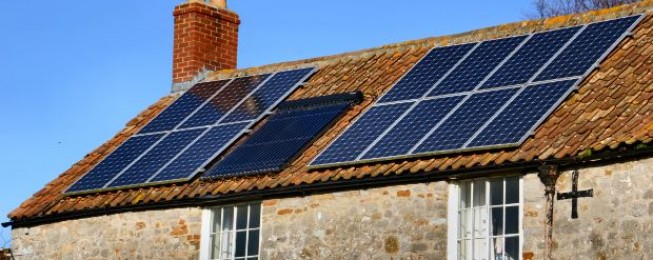 Climate, People and Scale – why we are missing opportunities for real change
Climate, People and Scale – why we are missing opportunities for real change
Richard Hoggett, IGov Team, 22nd April 2013
About Richard: http://projects.exeter.ac.uk/igov/people/igov-team/richard-hoggett/
Twitter: https://twitter.com/HoggettRD
The gap between the rhetoric and reality in climate and energy policy has never been wider. We recently passed the symbolically important 400 parts per million level of carbon dioxide in our atmosphere, a level not seen for millions of years; and WWF asked how long will it be before we hit 450ppm, the level at which there is a 50:50 chance of keeping global warming to less than two degree centigrade. New research also highlighted that, based on nearly 12,000 peer reviewed papers on climate change, less than one per cent of them reject human causes. A new report from the IMF on global subsidies for fossil fuels showed that in 2011 these amounted to $1.9 trillion in 2011, equivalent of about two and a half per cent of world GDP. Whilst research from Carbon Tracker shows how little of the world’s current proven reserves of fossil fuels can be used if we are to avoid the worst effects on the climate.
The current UK government continues to show poor leadership on climate change. This includes on-going support for fossil fuels, such as the tax breaks offered to both oil and gas, and more recently shale gas. There are suggestions that they may now support the import of Canadian tar sands oil, despite the impact these have in terms of climate emissions. We have sceptical senior politicians undermining climate action – Osborne, Hayes, Paterson, Lilley, even Gove is giving it his best try. Not to mention the on-going political fudging around introducing a 2030 decarbonisation within the Energy Bill. Most recently the Government confirmed its position on pushing ahead for ‘responsible’ shale gas production – despite the fact this could lock the UK into fossil fuels for longer, may have little impact on energy bills, and cannot be relied upon to increase our energy security. It needs to be left in the ground.
In our policy goals for climate and energy security, as well as affordability, climate is coming out a very poor third. In recent blogs, my colleague Matthew Lockwood highlighted that not only is the climate change act not politically secure, but that there is a growing populist climate denial, requiring new and better communication on the issue. More political attention is instead given to concerns over the lights going out, driven in part by the media – despite the reality of this being low; and most importantly to growing concerns over energy bills. Voters are also portrayed and understood as being more interested in other issues, such as economic growth and employment – the salience of climate change, for many, is comparatively low compared to these. No doubt, many also feel disempowered by the enormity of climate change, the implications it has for how we live our lives and what we might be leaving for our children. The result, no political party is serious about climate change.
How have we got to here?
Whilst our energy system has changed to some degree over the last few decades, and we have made some ambitious targets, the policy approach has not led to structural change or more sustainable outcomes. This in part, I think, reflects the fact that the grey, pale, males that dominate the energy policy world are stuck into centralised thinking: Large scale generation and supply; institutions; rules and regulations; and a focus on supply almost regardless of the level of demand. All these suit a few big players and the money, influence and lobbies that come with them. These incumbents are able to use their assets and strength of position to resist or direct the kind of change that could be forthcoming. Furthermore, the dominant pro-market approach, and the institutional regime that is been built around it, favours these incumbents and those technologies that are least disruptive to it. Our current ability to make a transition is therefore constrained by the nature of the UK’s institutional system and policy paradigm – something IGov is focussing on.
In addition, energy continues to be viewed as commodity, rather than a public good, with no serious or sustained attempt to engage people about the climate or energy options that we have. People are characterised as passive, unaware and uninterested in energy and so the impacts our demand for direct energy services (heat, light, mobility, etc) and of our wider indirect consumption of goods and services, get lost from view. This is all tied up in our behaviour, lifestyle and consumer practices, which interrelate in multiple and complex ways. However, tackling climate change and moving to a low carbon future needs both the acceptance and take up of low carbon technologies, and changes in the way people use, think and interact with energy.
How might this change?
Clearly there is no one solution, but an important and overlooked one, for me, relates to scale. A lot of our end use comes down to the built environment in which we work and live. Reducing demand is the logical first step, something the complexity and interest rates of Green Deal may or may not achieve, especially in light of its early results; and as ACE recently highlighted, as something the DCLG consistently undermine. Making energy-use more visible through smart meters and the options this may open up for demand side response also have a role to play. In addition, local generation can create more active consumers (or pro-sumers) through smaller scale technologies, like PV at the building scale. Data on the UK feed-in-tariff shows that within three years there have been over 379,000 installations – there is not a direct correlation, but this represents a significant number of new players within the energy system, as well as new investment. I have written before on how Community-led approaches can also play a central role, attracting local investment; increasing participation, control and democracy; and helping to change attitudes and behaviour towards technologies, demand and the climate. Increasingly those schemes that generate revenue are also able to self-fund wider energy and sustainability initiatives at the local level. These projects come in ranges of scales, and many are not small and cuddly – the ambition and appetite is considerable. Most of these projects, outside of Scotland at least, have emerged despite of policy, not as result of it. More individual or community based approaches are not for everyone, but for those able and willing to participate, they potentially offer an important route for moving to a more sustainable energy system.
It’s early days for knowing the impact of these sorts of approaches in terms of wider behaviour and emission reductions at the household and community level, but the signs are positive – from communities themselves, funders, academics and from those suppliers that put the people at the centre of what they do. Yet successive governments have never given much space or support for more decentralised, people-focussed approaches; it’s always been a side show in the centralised thinking. Grant programmes have been small, and have come and gone. The frameworks that shaped and enabled local authority engagement and support were also dismantled by the Coalition; including regional energy and sustainability strategies, and the National Performance Framework that included indicators for per capita carbon dioxide emissions – something that was widely adopted by local authorities.
If we are serious about climate change, the economic benefits that green growth can bring and if we recognise that people need to be engaged – scale deserves more attention. The market needs to change to benefit those who pay for it – i.e. people. The Energy Bill is a million miles from this, despite some recent potential positive noises for smaller scale generators. Evidence to the current ECCC sessions on local energy is highlighting the range of benefits that smaller scale projects can bring, as well as the barriers that these sorts of approaches face. DECC are also in the process of developing a community strategy; let’s hope this has some real meat to it and that it gets some space and recognition in the bigger picture of things. For me, an approach that puts people back into the heart of the energy system is a missing part of the low carbon jigsaw, collectively we all can play a much bigger role than our politicians are currently willing to acknowledge or support.
Martin Wolf recently pointed out that there is a risk that we will watch the rise in greenhouse gases until it is too late to do anything about it. In John Ashton’s talk last week, he highlighted that to fix climate change politics, we need to fix politics itself, to get the consent and democracy is an explicit political choice – the social fabric and public vision have and are being lost. This requires leadership and giving people an honest and real opportunity to play an active and meaningful role within the market; it could also open up a more democratic and effective approach to a sustainable energy future.
Related Posts
« Previous Presentation: Being Specific about the Politics of Low Carbon Transitions New Thinking Blog: Contracts for Difference – Devilishly Detailed Next »







